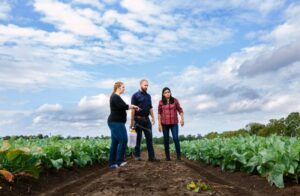We are delighted to welcome The University of Queensland (UQ) as a new member of APRU. We welcome UQ Vice-Chancellor and President Professor Peter Høj AC and his colleagues to our association and look forward to a valuable and productive partnership.

Founded in 1909, UQ is Australia’s fifth oldest university and a member of the Group of Eight (Go8), a coalition of world-leading research-intensive Australian universities.
For more than a century, UQ has educated and worked with outstanding people to create positive change for society. UQ research has global impact and is delivered by an interdisciplinary community of more than 1500 researchers at six faculties, eight research institutes and more than 100 research centres.

Student Life at UQ Gatton campus
UQ ranks in the top 50 as measured by the Performance Ranking of Scientific Papers for World Universities. The University also ranks 47 in the QS World University Rankings, 42 in the US News Best Global Universities Rankings, 66 in the Times Higher Education World University Rankings and 54 in the Academic Ranking of World Universities.
UQ’s innovations have made and continue to make genuinely life-changing advances.
Research highlights include Gardasil®, the cervical cancer vaccine; Triple P – Positive Parenting Program; world-leading MRI technology; and advances in biopharmaceuticals and sustainable biofuels.
The APRU is a network of 51 leading research universities from around the Pacific Rim, linking the Americas, Asia and Australasia, including approximately 200,000 academic staff and 2 million students.
UQ’s research strengths align closely with APRU’s primary research areas of natural hazards and disaster risk reduction, women in leadership, population ageing, global health, sustainable cities, artificial intelligence and the future of work, the Pacific Ocean, and labour mobility.

BioClay is an agricultural nanotechnology innovation that could help reduce food production losses to pests and pathogens, without the toxic environmental impacts of current chemical sprays.
“The University of Queensland has a reputation for creating change through research and commercialisation, and its APRU membership will surely help us add to APRU’s impact in connecting research and education to international policy development,” APRU Secretary General Dr Christopher Tremewan said.
“UQ already enjoys strong bilateral partnerships with most APRU members, which will be further enhanced via direct participation in the APRU network.”
Professor Høj thanked APRU for the formal invitation to join and said UQ looked forward to collaborating with members to create effective solutions to the grand challenges of the 21st Century.
“In pursuing our vision of ‘Knowledge Leadership for a Better World’, UQ is committed to transforming our successes into far-reaching benefits for communities around the world,” Professor Høj said.
“By collaborating with international partners and important strategic alliances, we are more likely to produce cutting-edge publications and relevant research outputs that address pressing global challenges, along with graduates who are effective leaders on the world stage.
“Since its foundation in 1997 by the presidents of UCLA, Berkeley, Caltech and the University of Southern California, APRU has been a leading voice of knowledge and innovation for the Asia-Pacific region.
“We are proud to now be included among its members and to contribute to the exchange of ideas and creation of new knowledge that will help address local and global challenges affecting the region.”
